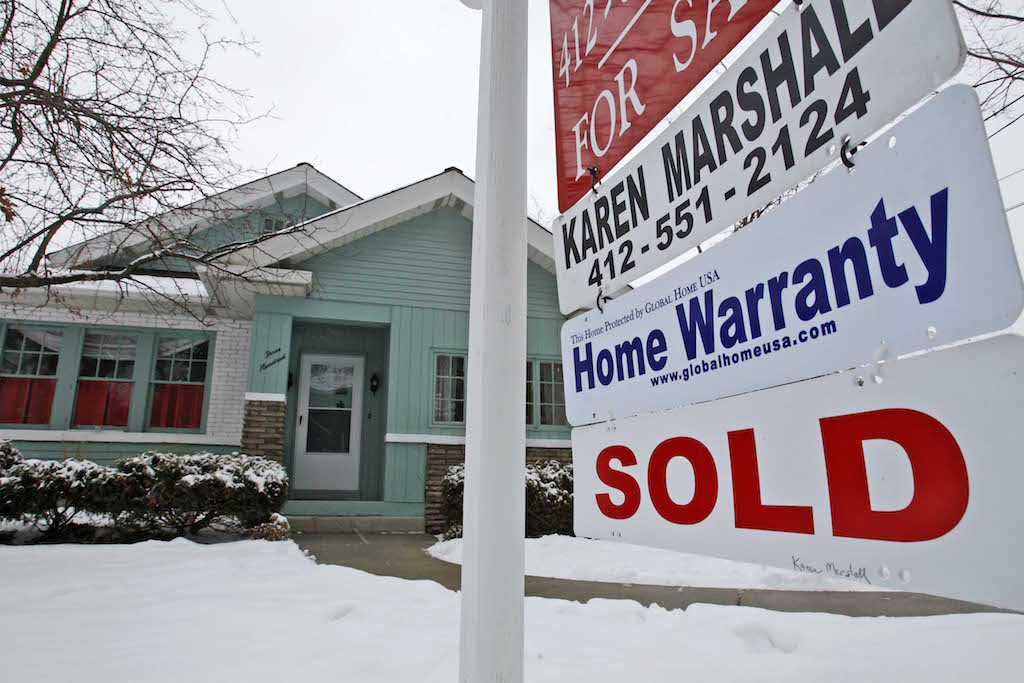New Banking Bill Could Lead to More Housing Discrimination
Tim Kaine, Mark Warner and 10 other Democratic senators are backing Republican reform legislation that helps Wall Street and hurts Main Street. A home for sale in Mount Lebanon, Pa. (Gene J. Puskar / AP)
A home for sale in Mount Lebanon, Pa. (Gene J. Puskar / AP)
A new banking bill shows the division of the United States. The Economic Growth, Regulatory Relief, and Consumer Protection Act, sponsored by Republican Sen. Mike Crapo of Idaho and co-sponsored by a dozen Democratic senators, would weaken financial regulations and expand loopholes, actions that could hurt many Americans.
“This is a bad bill,” Sen. Elizabeth Warren, D-Mass., told The Huffington Post. “No Democrat and no Republican should support it.”
The bill’s Democratic co-sponsors are Tim Kaine and Mark Warner (both from Virginia), Michael Bennet (Colorado), Gary Peters (Michigan), Doug Jones (Alabama), Joe Donnelly (Indiana), Jon Tester (Montana), Heidi Heitkamp (North Dakota), Joe Manchin (West Virginia), Claire McCaskill (Missouri), and Christopher Coons and Thomas Carper (both from Delaware).
Backers say the bipartisan reform legislation would ease some of the tough rules of the 2010 Dodd-Frank law, thereby helping small community banks and credit unions, while still protecting against unfair lending practices and strengthening consumer protections.
Opponents disagree and are concerned about rolling back anti-discrimination enforcement, HuffPost reports.
“[The bill] deliberately undermines the government’s ability to enforce laws against racial discrimination in the housing market,” Zach Carter writes. “The legislation would block the Consumer Financial Protection Bureau from collecting key data showing when and where families of color are being overcharged for home loans or steered into predatory products … just one small provision in a broad financial deregulation package.”
Carter provides more of the backstory:
The federal government has been collecting basic data on mortgage discrimination since 1975, tallying by race which families receive loans and which are denied. Banks have always made a habit of turning down mortgages in black neighborhoods—a practice known as redlining that is still very much alive and well. But the housing bubble and subsequent foreclosure bust laid bare another ugly trend. Lenders had also been targeting minority families with subprime mortgages and other predatory loans, instead of simply denying mortgages outright.
The 2010 Dodd-Frank financial reform law sought to address this by setting tougher predatory lending rules and by requiring banks to turn over a broader swath of information to the newly created CFPB. In addition to basic facts about loan approval or denial, lenders had to report a borrower’s age and credit score as well as the property value of the home being purchased, the interest rate, loan terms, and other pricing features of each mortgage. All of this information can be used to help determine if families of color are being ripped off or disproportionately pushed into predatory loans. The CFPB looks through the data for violations or red flags, and publishes it online so consumer groups can do their own research.
Under the legislation, banks that make 500 or fewer mortgages a year would not have to report any of the additional data, Carter adds. That’s about 85 percent of banks and credit unions, according to CFPB estimates. In other words, the new system could impact hundreds of thousands of borrowers a year.
The bill is expected to pass through Congress and be signed by President Donald Trump. Critics hold out hope that supporters on Capitol Hill will wake up before another financial crisis occurs.
“It’s a whose-side-are-you-on moment,” explained Sen. Sherrod Brown, D-Ohio, the ranking Democrat on the Senate Banking Committee. “Are you with the big banks and the Wall Street operators who wrecked the economy and got big bailouts, or are you with families and workers?”
Not so long ago, Trump campaigned for a new America and vowed to govern for the people.
Independent journalism is under threat and overshadowed by heavily funded mainstream media.
You can help level the playing field. Become a member.
Your tax-deductible contribution keeps us digging beneath the headlines to give you thought-provoking, investigative reporting and analysis that unearths what's really happening- without compromise.
Give today to support our courageous, independent journalists.




You need to be a supporter to comment.
There are currently no responses to this article.
Be the first to respond.